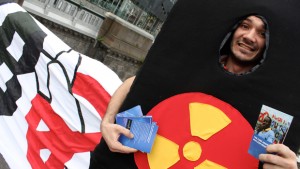 Opinion polls show that Australians overwhelmingly oppose nuclear weapons. So when we learned in 2011 that our major federal government investment fund – the so-called Future Fund – has substantial investments in nuclear weapons companies, there was widespread public uproar.
Opinion polls show that Australians overwhelmingly oppose nuclear weapons. So when we learned in 2011 that our major federal government investment fund – the so-called Future Fund – has substantial investments in nuclear weapons companies, there was widespread public uproar.
Melbourne’s leading daily newspaper, The Age, ran a front-page story with the headline: “Australia investing in nuclear arms.” The following day, readers reacted angrily on the letters pages, and a cartoon depicted businessmen being hurled through the air by an exploding nuclear bomb. “The Future Fund goes ballistic,” read the caption.
We uncovered this controversial information using freedom-of-information laws, which allow any member of the public to gain access to documents held by Australian government agencies. There was no charge for this service.
When the news broke, the Future Fund stated that it had no plans to divest from companies involved in nuclear weapons production, even though it had earlier divested from cluster munitions and landmines. It claimed that countries such as the United States, Britain and France possess nuclear weapons legitimately.
Not satisfied with this response, we encouraged friendly senators to quiz the Future Fund leadership about their position in the parliament. This helped keep the issue on the political agenda. The minister overseeing the fund, Senator Penny Wong, was forced to defend the position.
We then commissioned legal advice from a team of top barristers, who found that the Future Fund had failed to comply with its own stated investment policies. They noted that, under Australian law, it is an offence to assist the “manufacture, production, acquisition or testing” of nuclear explosive devices both inside and outside Australia.
More recently, we submitted 14,000 petition signatures to the chair of the Future Fund demanding that he back efforts to achieve a nuclear-weapon-free world. We also protested outside the Future Fund’s headquarters. We believe that it should set a positive example for other financial institutions in Australia.
We have learned that it’s best to focus on a small number of financial institutions, or just one, rather than every financial institution with a possible link to the nuclear arms industry. Ideally, the targeted institutions should be those that are most susceptible to public pressure and most likely to lead the way for other institutions to divest.
The Don’t Bank on the Bomb report in 2012 revealed that most Australian banks have provided loans to nuclear weapons companies at some stage since 2008. Disappointingly, none have shown a willingness to divest, but they draw the line at financing projects specifically for nuclear weapons work.
As part of our divestment campaigning, we have also approached all major Australian superannuation funds. Some of the more progressive funds agreed to conduct a review of their investments to ensure that no nuclear weapons companies had slipped through the gaps. Others noted that their “ethical” options (but not their general funds) already exclude the arms industry.
In 2013 we launched a report on university investments in nuclear weapons companies, titled Disarm Your Degree. Although the universities we targeted were all public institutions, it was often difficult to find detailed information on their investments. Where we could confirm they invested in nuclear weapons companies, we have worked with students and academics to build pressure for divestment.
While tangible successes to date have been limited, our work has at least helped raise public awareness about the ongoing threat of nuclear weapons. It has shown how this global problem can be dealt with at a local level, even in countries without nuclear weapons. And it has reinforced the need for a total ban on nuclear weapons – so no financial institution can ever claim these weapons are “legitimate”.
Tim Wright is Australian director of ICAN.
